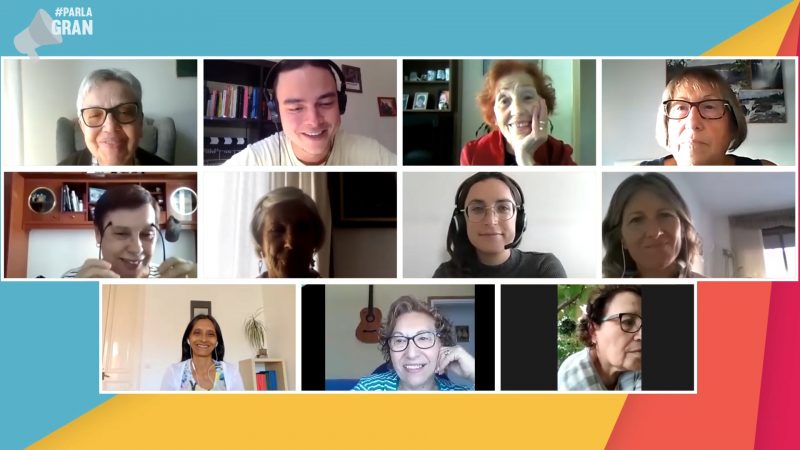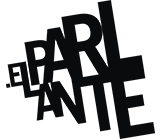Fear: Alfredo Cohen and Leticia Pipman

In the Parlante we are dedicated to the design, implementation and evaluation of communication and education strategies for the strengthening of active citizenship, as well as for the creation and consolidation of scenarios that allow the community encounter and dialogue on topics that affect the people who participate in them.
For years, participants highlighted in these processes the fact that they were spaces of freedom that helped to create and strengthen interpersonal ties. The pandemic unattended by Covid-19 made us reaffirm the importance of working from and on care, maintaining the intercultural perspective but especially reinforcing the intergenerational one. For more than 5 years we have been working with older people -especially women- with many things to say, many stereotypes to demolish, many ideas to contribute. The closing of the Casles de Gent Gran as spaces conducive to meeting, dialogue and community action by these women were closed during the crisis and even today, almost two years after the pandemic was sale, they operate at half gas. In this sense, from the beginning we thought that we could not stop doing our work and that technology could also be at the service of these people despite the digital divides.
#ParlaGRAN Maternity is not a simple call over Zoom, nor is it a conference, nor is it a focus group… It is an educational project that aims to enhance intergenerational relationships to understand and demystify together the imaginaries of motherhood over the years. The initiative emerges as a strategy to socialize the results of the research ” The ideology of intensive motherhood as an example of symbolic violence” by Mittzy Arciniega, Lorena Gómez, Nele Hansen, Pilar Medina, Sonia Páez de la Torre and Ariadna Santos, researchers at Pompeu Fabra University and proposes that the results of these investigations be discussed with communities that perhaps these topics have not been questioned beyond the scope of the proven.
#ParlaGRAN Motherhood understands the dialogue itself as an agent of change. Dialogue and especially listening as a possibility for horizontal, collaborative learning, regardless of the age and technology that environments it. The people who participated in the meetings valued them as scenarios to question, reaffirm and relate. To speak of motherhood is to speak of expectations, fears, frustrations and immense joys. It’s talking about our origins, our intimate memories, our frustrations. It is to overthrow stereotypes, to question common places. Approaching motherhood is always an adventure, a decision, even for men like me, any approach will never be enough.
Production
To produce #ParlaGRAN Maternity had to bring together 16 women, diverse mothers, who in some way could also reflect other women mothers who live in Barcelona. Many people I know came to my mind, and I imagined them all so busy that I doubted the success of the call.
The older mothers.
Eight of them must have been women over sixty and five years old. Here we had some advantage for taking months working online with a group of ladies who learned to use Zoom and the browser with the excuse of being able to see their faces when it was the only way. Talking and learning to create your own programs is a process in which we continue to insist… But that’s another matter. This is how Paquita, Hortensia, Paqui, Carmen, Rosa and Santi signed up, for them the subject had a lot to talk about, and they believed from the beginning that it was important. In addition, the fact that it was a project among women of different ages was stimulating to them. Montse managed to organize herself miraclely, she is a grandmother, mother, artist and takes care of taking the plant shop with one of her daughters. She is also a volunteer at the Casal de Persones Grans in Baix Guinardó. And if he said details of each of them, his agenda of activities would be similar. Those of this group are exceptional, especially for us who know them and have been enjoying projects with them for months, but what this reflects is that there are many older people eager to share, learn, participate … In fact, despite the restrictions, they put together waiting lists in summer camps and different spaces with activities for older people. They are all very diverse: Victoria, for example, is an activist and at the same time she enjoys making home videos in which she herself makes the scripts and records herself, hates making video calls, is increasingly harsh on screens, she tells us. But there I was in the meetings, because there must be something in this meeting that makes them… that does us good.
The youngest mothers.
I started to contact other women, younger mothers and whom I knew much less, or nothing at all. I suppose that being the mother of a 12-year-old boy makes it easy to empathize with the lack of time to do anything other than work or act as a mother is absolute. So, calling them to ask them to give us an hour and a half of their time, it became impossible for me. I talked to Eli, Marta, Carla, Vanessa and the feedback on the proposal was very positive. The comments we made to each other about being a mother today took away minutes, ideas, emotions, joy, frustrations, tiredness, laughter and a move forward without retro mirrors. But also or just because of that, there was a need to stop at least a moment… and reflect. Do you have to be a superwoman’s to have personal, intimate spaces, or to do yoga, go to the movies? Can we really choose our way of breeding or do we do so in response to a capitalist and patriarchal model? Is it okay to dedicate ourselves exclusively to nuestr@s children? What role does the community around us play? Do we feel part, do we feel seen, accompanied, cared for? At the end of these micro telephone conversations I understood the real need of the project. It was almost an emergency, so I also contacted Eva, Claudia, Cristina and Carla. Each of them with much to share, women living in Catalonia, born in Barcelona, but also in Peru, Ecuador, Argentina. Women who have experienced motherhood in many different ways. Diverse, unique maternity wards, despite the common spaces.
We conducted five meetings and in all the time was short. Surely the desire to talk, to share ground, to laugh at ourselves, to forgive ourselves, to relax, is also a way of taking care of ourselves, of recognizing ourselves. In the end, we all had the need to share but also to be heard. The illusion that these recorded dialogues can serve as a mirror for other mothers – and why not – women who are not yet mothers or parents who want to distance themselves from the roles that have been assigned to them from patriarchal privilege.
They served me to recognize that I am not alone, that the personal is political, that I am not the only one to whom certain things happen to me, that deep down we all have something – or a lot – to do with this.
